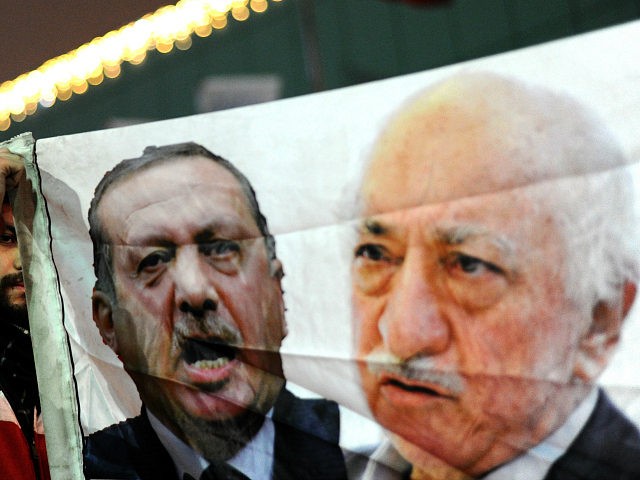A Turkish prosecutor has filed an indictment against the CIA and FBI for allegedly having active involvement in last month’s failed coup attempt against Islamist President Recep Tayyip Erdogan and using Pennsylvania-based cleric Fethullah Gülen to ramp up opposition to Erdogan in the Turkish military.
“The CIA and FBI provided training in several subjects to the cadre raised in the culture centers belonging to the Gülen movement,” the indictment, filed in the Edirne Chief Public Prosecutor’s Office, reads, according to the Turkish newspaper Hurriyet. “This [failed coup] attempt aimed to weaken the state with all its institutions by getting rid of the government completely. Those in the Gülen movement who work in the judicial and security institutions and who received the aforementioned training, took on this task and moved into action.”
The newspaper reports do not specify the evidence linking the coup perpetrators to either Gülen or the CIA or FBI. Turkish newspapers favorable to Erdogan have alleged numerous ties between the U.S. government and Gülen, however, insisting that the U.S. government should extradite him for the crime of orchestrating the coup operation. Gülen runs a group of Islamic charter schools in the United States, which have been raided by the FBI or alleged misappropriation of public funds.
A who’s who of news agencies run by states hostile to America have dutifully republished the news of the indictment, including Iran’s Fars News, Russia Today, and China’s Xinhua. While the Russian government spent most of 2016 accusing Erdogan of purchasing millions of dollars in crude oil from the Islamic State, the Kremlin appears to be making efforts to thaw the relationship with Turkey, and Erdogan is set to meet with Vladimir Putin in Russia on August 9.
The indictment is not the first such accusation from an Erdogan-friendly source. The newspaper Yeni Safak, which has long established a reputation for having a bias towards Erdogan’s Islamist Justice and Development Party (AKP), accused retired U.S. Army General J.F. Campbell of personally planning the coup against Erdogan. Campbell denied the accusation, noting that he was too busy sharing a beer with Geraldo Rivera on the night of the coup to have had anything to do with it.
Beyond the United States, Erdogan’s government has made an effort to place the blame on Gülen. Turkish Prime Minister Binali Yildirim publicly denounced the “despicable” coup attempt and accused Gülen personally, on the same day that American authorities confirmed that Turkey had sent Washington Gülen’s dossier and non-publicly available evidence tying Gülen to the coup, as well as a formal extradition request.
Media outlets favorable to Erdogan – the only kind remaining in Turkey following the coup attempt – also published “evidence” against Gülen: alleged confessions from military coup plotters that they were members of the Gülenist Terror Organization (FETÖ), as Turkish officials refer to the Gülen group.
In a statement before the coup attempt was thwarted, alleged plotters stated their reason for acting as a need “to reinstall the constitutional order, democracy, human rights and freedoms, to ensure that the rule of law once again reigns in the country, for the law and order to be reinstated.”
Erdogan’s party won a landslide reelection in November, after having its majority diminished significantly in July 2015. Erdogan rapidly called for new elections following this defeat, which were marked by multiple reports of irregularities at the polls, the raiding of a major anti-Erdogan media conglomerate, and reports of hundreds of physical attacks on minority party members. In addition, two major terrorist attacks – one in the border town of Suruç and one in the capital, Ankara – targeted the nation’s Kurdish minority, who had rallied behind the People’s Democratic Party (HDP), a rival to the AKP.

COMMENTS
Please let us know if you're having issues with commenting.